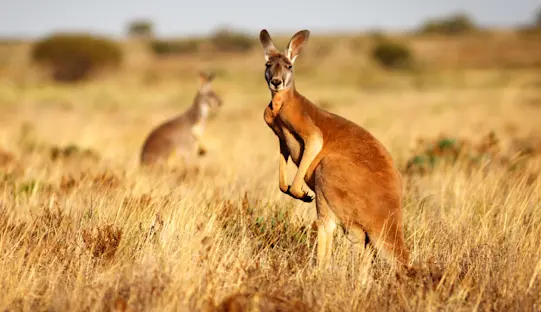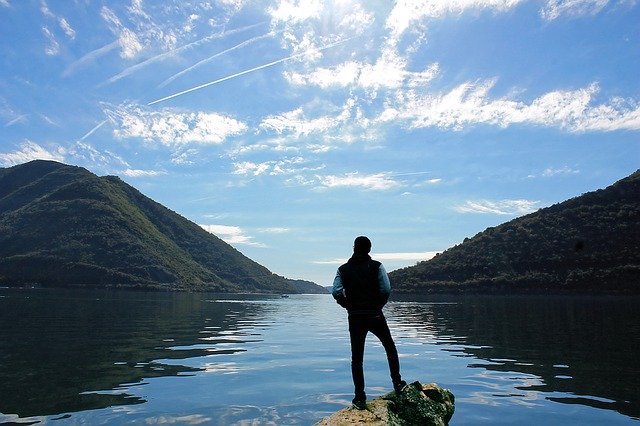
Nature soothes the soul. Image by Kevin Phillips from pixabay.com
Are you reading this on your iPad? Between texts on your smartphone? Do you share our posts via Facebook or tweet our short links? Much as I’m grateful to have you as a Natural Habitat Expeditions reader, I’m going to suggest you cool that a bit and resolve to pursue more sheer, unadulterated experience this new year.
Join me in declaring 2012 the year that we “Turn Off, Tune Out and Drop-In” (with thanks to my friend Greg Coe for that twist on Timothy Leary’s ’60s aphorism). There are few better ways to accomplish an internal cleansing of the mind and spirit than on a completely unplugged adventure in the wilderness.
One of the first things I did this new year was read Pico Iyer’s essay in the New York Times on The Joy of Quiet. Naturally, I read it online, via a Facebook link, which seems increasingly to be the way I get a lot of information. Yet there was irony in that experience: for Iyer writes about the costs of a life spent in perpetual connectivity, our attention constantly disrupted by the next digital distraction.
Iyer conveys some startling though not surprising data: the number of hours Americans spend online has more than doubled since 2005. The average American adult is now in front of a screen 8-1/2 hours a day. The average American teenager sends 75 text messages a day. My own daughter, on getting her first cell phone as a 7th grader, chocked up an average of 125 texts per day in the first couple of months she had her phone. That figure alarmed even her and prompted us to reconsider the “value” of unlimited texting plans.

Modern family between flights at Los Angeles International Airport. Photo: Wendy Redal
“In barely one generation,” Iyer says, “we’ve moved from exulting in the time-saving devices that have so expanded our lives to trying to get away from them — often in order to make more time. The more ways we have to connect, the more many of us seem desperate to unplug.”
Iyer mentions Internet rescue camps in China and South Korea, to save addicted kids. Or pricy, isolated vacation retreats where guests pay for the privilege of no TV and no Wi-Fi. Or – this one struck a chord with me – “Freedom” software for writers, which enables them to disable Internet connections for up to 8 hours to enforce focus and productivity.
Neuroscience research, Iyer reports, is revealing that our ability to think in depth, to empathize and to discern what is truly important is being compromised by the glut of fragmented information we navigate during our waking hours. And it’s a situation that not only perpetuates itself but ensnares us further, the more we feed the beast.
Harvard Business Review blogger and CEO Tony Schwartz writes, “The more I allow myself to be seduced by distraction, the more distractible I become.”
In a quest to reduce the “Pavlovian pull of the Internet,” Schwartz began to draw boundaries: no opening the laptop at home in the evening unless something was truly urgent, no BlackBerry in the bedroom.
What Schwartz found was more, with less.
“We need less information in our lives, fewer choices, and more depth.” By reducing the din, he found that he was “freed to give priority to what felt truly important.”
Schwartz didn’t disconnect entirely – which would be almost as impossible as choosing not to eat — but put himself on an “information diet.”
“The solution wasn’t to go back to my old habits – just as it isn’t after a traditional diet – but to permanently change my way of consuming.”
In both cases, Schwartz noted, with food and information, the challenge is to find a healthy balance. For a busy executive like Schwartz, that means unplugging on evenings and weekends to be fully present to his family. While he acknowledges that “the Internet is here to stay, with all the conveniences, richness and seductions it provides,” he intends to be less compulsive in his use of it.
Part of the challenge, especially for inquisitive minds like mine, is the desire not to miss out on crucial or interesting information. But the problem is, such information is infinite. We’ll never have enough time to devour all there is to know, or want to know, about what is available with a few keystrokes via Google. Those of us who thrive on social interaction will never be able to keep up with the Facebook feeds of hundreds of friends, like those currently in my network.
What happens after too much trying is a sense of utter mental overwhelm. And, if we’re lucky, resignation. For it’s only when we concede that we can’t keep up – that we shouldn’t try – that we can begin to liberate ourselves from the tyranny of our online lives.
For many, the New Year begins with resolutions to eat healthier, work out, detox our bodies. For most of us, an information detox should be as much a priority for our minds and spirits.
While changing daily habits is essential, I know of no better way to kick off a “full cleanse” than to retreat to the outdoors and eschew mobile technology.

My feet, atop 14,258-foot Mt. Cameron in the Colorado Rockies. Taken on a camera, not my iPhone. Wendy Redal photo.
It’s getting harder to avoid the digital tether, even in wild country. National parks like Grand Canyon offer ranger-guided audio tours that you can listen to on your cell phone at points along the rim. Phones may pick up signals on ridgelines, while wireless networks extend their reach ever farther. Satellite phones ensure that the office can reach hikers and rafters and backcountry skiers no matter where on the planet they go. New outdoor-oriented apps lure us with useful features to tap during our backcountry exploits, arguably enhancing aspects of our experience. The temptation to seek information, post about our adventures and make ourselves perpetually available is difficult to resist.
But the liberation that comes when we choose not to can be profound. Only when we deliberately unplug (what an outdated metaphor that is, in this wireless age) can we allow our brains the time they require to slow down, to contemplate, to go deep.
We are losing the art of sustained attention when our thoughts are constantly interrupted. Leaving the gadgets behind on a backpacking or kayaking trip allows you to fully engage the senses—to notice the shifting sky, the variety of wildflowers, to listen to the crackle and pop of floating chunks of ice while paddling an Arctic fjord. Or to listen to nothing at all, a rare experience amid the cacophony of daily life.
As our awareness is cultivated, our thoughts have room to mull and reflect and ponder — or to rest from activity. When we give our minds a chance to lie fallow for regular periods, our inner resources are nurtured. Our ability to distinguish what really matters to us is strengthened, when we step back from the fray.
For me, that drawing back and going inward almost always happens in quiet natural places. Richard Louv, author of The Nature Principle, identifies a compelling body of research to support the value of time in nature for our mental wellbeing.
My family has experienced these effects vividly when we have been alone in the wilderness for a few days at a time. It usually takes more than a short hike to decompress, to quit feeling the pull to check messages or update one’s Facebook status. By the time we were on our second day on the trail on a long trek in Wyoming’s Wind River Range, or snorkeling with sea lions in the Galapagos, or sifting through fresh snow while skiing in to a mountain hut, the allure of the electronic world felt distant and less imperative. We were calmer, lighter. We argued less. We felt more of that elusive quality called “joy.”

My daughter Bryn makes a new friend in the Galapagos Islands. Wendy Redal photo.
And so, for 2012, my explorer’s resolution is to focus more on that neglected inward quest — to get “out there,” in order to go “in there.” While an extended wilderness adventure in some exceedingly remote corner of the world may accomplish that best of all – a complete re-calibration of my inner being – I need to make ways to nurture a deeper focus a regular part of my life.
I’m starting with short online sabbaticals, like every Saturday. I’ll take my dog for a hike, but I’ll leave the cell phone at home. Twenty years ago, no one thought twice about being unavailable for a few hours at a time. In fact, there was often no way around it.
If you care to join me, I’d like to hear about your own efforts to tame the digital beast. And I’m sure other Natural Habitat Expeditions readers would, too.
Here’s to all that we will discover!
Wendy































